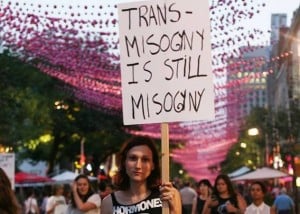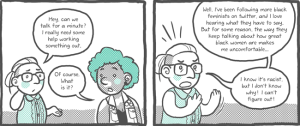Originally published on The Body Is Not an Apology and republished here with permission.
I am a queer person. The labels I use to describe this queerness are always changing and hardly ever stay static but I am undoubtedly queer.
I also come from a Mexican household, both of my parents were born in the state of Jalisco and migrated to the United States when they were a young newlywed couple.
I exist in the intersection of these identities: I am a queer United States-born Mexican who was raised Catholic.
Existing in this intersection often feels like an oxymoron since there is no space for queerness to comfortably exist within Mexican Catholicism.
Because of this, my existence often feels like a radical act in itself.
To demand a space for all of what I encompass as a queer Mexican, I am disrupting a culture that was born out of colonialism and which demands machismo and heterosexuality at its core.
By existing in this identity, here are five ways I have come to realize that Mexican queerness is a radical act.
1. It Disrupts Gender Roles
Gender roles are so engrained within Mexican culture that I spent my childhood believing it was my duty to learn how to cook so I could eventually make a good housewife for the invisible man I was expected to someday marry.
That is, I believed I had to perform femininity in the way Mexican culture taught me: by cooking, cleaning, and planning my life according to non-existent children and a non-existent husband.
Because I was raised as a girl, I was in the mindset that my life revolved around these future events and that everything I did would be to better my chances of being a good wife and mother.
The expectation of gender roles affects everyone negatively, yet differently.
While it affected me by making me believe that the pinnacle of my happiness would revolve around a supposed future marriage with a supposed future husband, people experience its consequences in a number of ways.
For many of the men in my family, it translates into performing hyper-masculinity. That is, there is a fear of being seen as weak, fragile, and unable to provide for their families.
This translates into toxic pride that almost hinders them and creates a power struggle between family members that is due to gender.
This creates a culture with pre-assigned expectations.
Queerness dismantles these expectations by creating a counter-culture that doesn’t rely on gender roles.
That is, I can engage in relationships (especially romantic relationships) without feeling like I have to live up to pre-approved standards.
It creates a better sense of equality between partnerships that relies on ability and communication instead of gender role expectations.
2. It Dismantles the Gender Binary
Besides disrupting gender roles, queerness does away with the gender binary as a whole.
Mexican culture relies on the gender binary because it upholds the belief that women are inferior to men.
By allowing the inferiority of women to exist within a culture, it makes it easier to control women by keeping men in a position of power that women aren’t allowed to easily question.
By doing away with the gender binary, the beliefs that sustain the culture become disrupted and these arbitrary rules begin to lose their power.
When non-binary, genderqueer, and transgender folk demand a space for ourselves in a culture that heavily relies on our erasure, we are putting a wedge in the belief that only men and women must exist.
This then puts a wedge in the belief that men are inherently superior to women.
When I first came to terms with my genderqueerness, it felt as if years of conditioning had washed away from me, and I was able to live authentically as myself instead of feeling a need to always fit into this predisposed “girl” mold.
Existing within my nonbinary gender identity was a radical act because I was actively choosing to demand a space for the parts of me that are neither man nor woman and which can’t be controlled according to the standards set in place by the existing gender binary.
3. It De-centers Heterosexuality
Compulsory heterosexuality is expected within Mexican culture.
As a child, I never expected myself to be otherwise. I didn’t experience a childhood fearfully stuck in the closet. I genuinely believed I was heterosexual because I was never given a space to explore outside of it.
Because of this, I didn’t experience my “queer awakening” until I was in my late teens and that involved a lot of self-hate and confusion I had to overcome.
Exploring queerness as a young queer was not only crucial for my mental and emotional health, it was also an act of bravery because it went against compulsory heterosexuality, which was all I had known up to that point.
Actively looking into queerness went against everything I was taught.
I could’ve lived my whole life rejecting the notion that I was queer. I could’ve forced myself into only having relationships with cisgender men to hide the fact that I believed I was queer.
Instead, I chose to explore the possibility of experiencing attraction towards people who didn’t fall into this pre-approved category.
By doing away with compulsory heterosexuality for ourselves, we’re deviating from the social norms.
Living as our authentic selves and accepting our queerness is a radical act in a society that conditions people to believe that deviating from the social norms is punishable. That the fear of punishment should be enough to get us to comply and pretend to fit into heterosexuality.
4. It Creates a Space for Non-Traditional Attraction
Within our culture, the commonly accepted type of attraction exists in the form of heterosexual romanticism and sexuality.
Contrary to popular belief, this isn’t the only combination for attraction that can exist.
Queerness de-centers traditional attraction by creating a space for polyamory and the many ways that romantic, sexual, and platonic attraction can be matched, mismatched, and practiced.
That is, queerness allows fluidity of attraction.
Because there are countless gender identities and countless ways of being platonically, romantically, or sexually attracted to someone, queerness creates a space for non-traditional attraction by taking all of this into account.
Practicing non-traditional attraction is radical because it allows the existence of different types of relationships that don’t need to be forced into the mold society expects us to place around them.
This is freeing.
It allows us to cultivate relationships that are built primarily around the needs and wants of the people engaging in it, instead of the expectations set in place of what the relationship “should” look like according to societal standards.
5. It Goes Against Catholicism
Catholicism has historically been used as a tool of colonialism and still continues to be used as a tool of compliance and oppression.
Fear of sin, eternal damnation, and prosecution has created a culture where queer folk have repressed our queerness as a survival mechanism within a mainly Catholic culture.
For myself, the majority of the self-hate I experienced as a young queer was heavily related to my Catholicism.
No one in my family or church ever actively told me that being queer was a sin. Nobody had to, I was taught to internalize fear of deviating from heterosexuality.
The first time I had romantic feelings for someone who wasn’t a man was damaging because I felt I had to hide it from people who claimed to genuinely care for me.
Because of Catholicism, I felt like I couldn’t share this information with people who had always claimed to have my best interest at heart. I felt marginalized and ashamed of my deviance.
I didn’t have a safe space to communicate with people because I was afraid I would encounter their judgment and anger instead.
Accepting our queerness as people who were raised in a culture that centers Catholicism is a radical act because we are denouncing shame and fear and choosing to live authentically despite being told that our queerness is punishable.
[do_widget id=’text-101′]
Search our 3000+ articles!
Read our articles about:
Our online racial justice training
Used by hundreds of universities, non-profits, and businesses.
Click to learn more





















